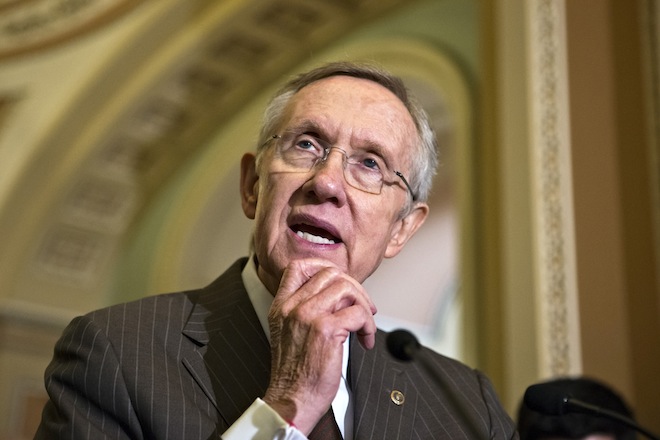The filibuster wars are poised to escalate this month as Senate Democratic leaders hold their fingers close to the trigger of the nuclear option.
Senate passage of immigration reform has cleared the way for the chamber to take up a slew of important presidential nominations. Republicans have threatened to block them, and Democratic leaders have in response threatened to change the rules by a partisan vote and eliminate the minority’s ability to filibuster the confirmation of nominees.
Multiple nominations are pending, including three to fill vacancies on the powerful D.C. Circuit Court of Appeals, five picks for the National Labor Relations Board and an additional three to run the Consumer Financial Protection Bureau (Richard Cordray), the Labor Department (Tom Perez) and the Environmental Protection Agency (Gina McCarthy). Democratic leaders postponed the likely standoff in order to prioritize the completion of immigration legislation.
Although he hasn’t yet set an official timeline, Senate Majority Leader Harry Reid (D-NV) is prioritizing the three executive nominees and intends to bring them up for votes in July. All have faced confirmation hearings. For now, none of them are safe from a Republican filibuster. GOP senators have expressly promised to filibuster Cordray or anyone else to the CFPB until Democrats agree to weaken the consumer agency’s regulatory authority.
Democrats also want to fill vacancies on the NLRB, which settles disputes between businesses and workers, and is the subject of an upcoming Supreme Court case about the President’s power to recess-appoint nominees. Republicans, who dislike the agency itself, opposed President Obama’s picks in committee.
The D.C. Circuit picks are expected to take longer as they have not faced hearings yet. But the wheels are already in motion. The Judiciary Committee has scheduled a confirmation hearing for the first of them, Patricia Ann Millett, on Wednesday.
Republicans argue that the three remaining vacancies on the influential court ought not to be filled at all, a notion that Democrats dismiss as ideologically driven and hypocritical. GOP leaders have telegraphed a mass filibuster of the three nominations by introducing legislation to reduce the number of active judges on the D.C. Circuit from 11 to eight, eliminating the three vacancies.
Meanwhile, the White House is doing heavy lifting on Millett’s behalf. A letter signed by six former U.S. solicitors general (three from each party) vouches for Millett’s confirmation, saying her “qualifications and character make her ideally suited for a position on that distinguished Court.” The signatories include conservative heavyweights Paul Clement, Kenneth Starr and Ted Olson — the same lawyers who backed the confirmation of Sri Srinivasan before he was unanimously confirmed by the Senate.
If Republicans sustain their blockade of the nominees, Reid has threatened to strip away the filibuster for nominations with the so-called nuclear option, by which the majority can change the rules of the body with a bare 51-vote majority. Sources familiar with his thinking say that while the majority leader is fed up with Republican obstruction and is ready to move forward with the nuclear option, it’s not clear he has the votes yet. With 54 Democratic senators, he has little room to spare.
Senate Minority Leader Mitch McConnell (R-KY) has fumed at Reid’s threats, vowing that going nuclear will spell the beginning of the end of the 60-vote Senate on all matters, and promising that Democrats will regret having pulled the trigger when they’re in the minority. McConnell will face significant pressure to let at least some of President Obama’s nominees through, lest he strengthen Reid’s case for going nuclear.
The standoff is shaping up to resemble a high-stakes poker game between Reid and McConnell, where the two leaders each gauge how serious the other is about the cards they hold and either fold or call their opponent’s bluff accordingly.






